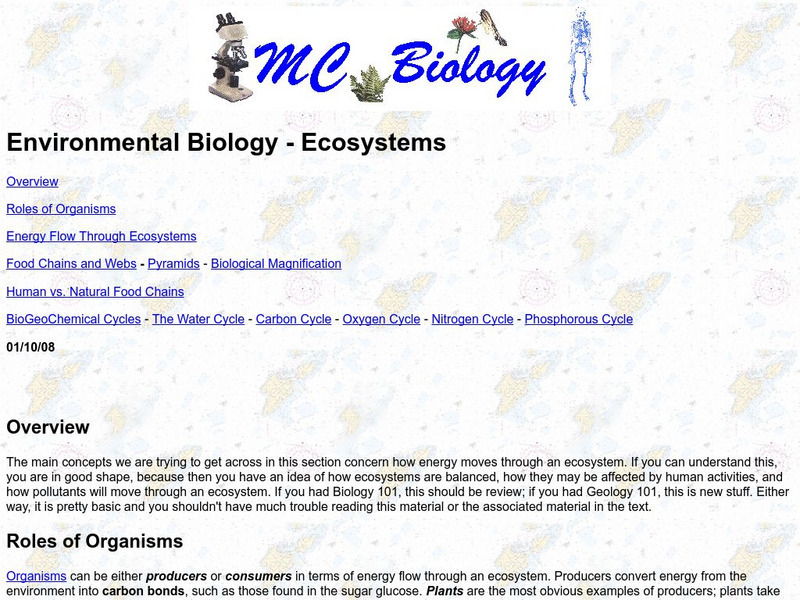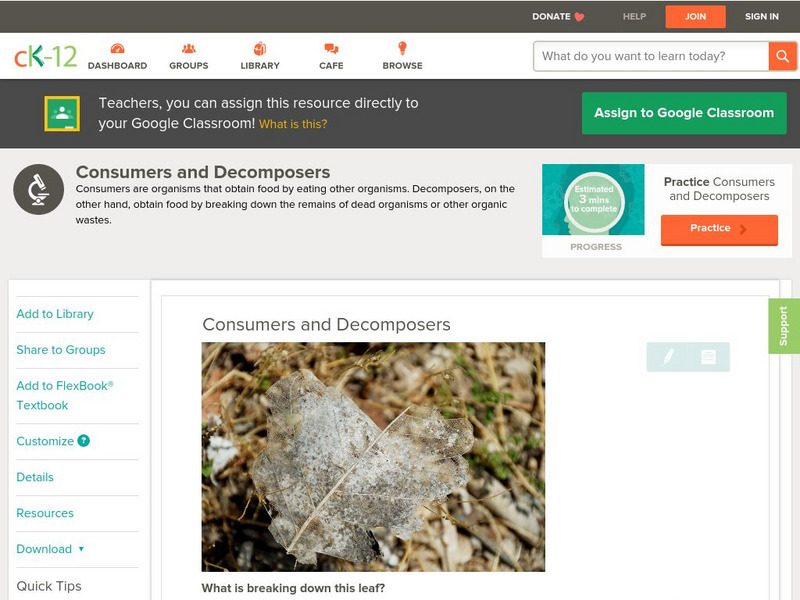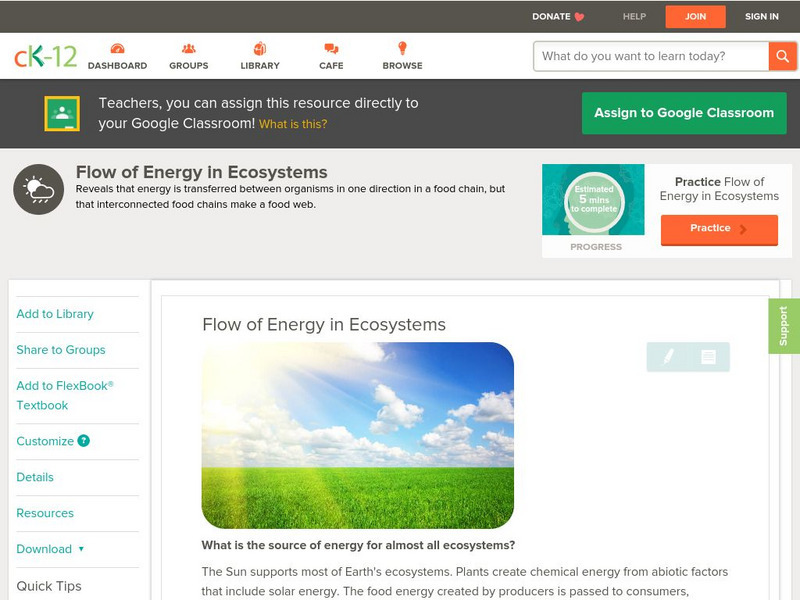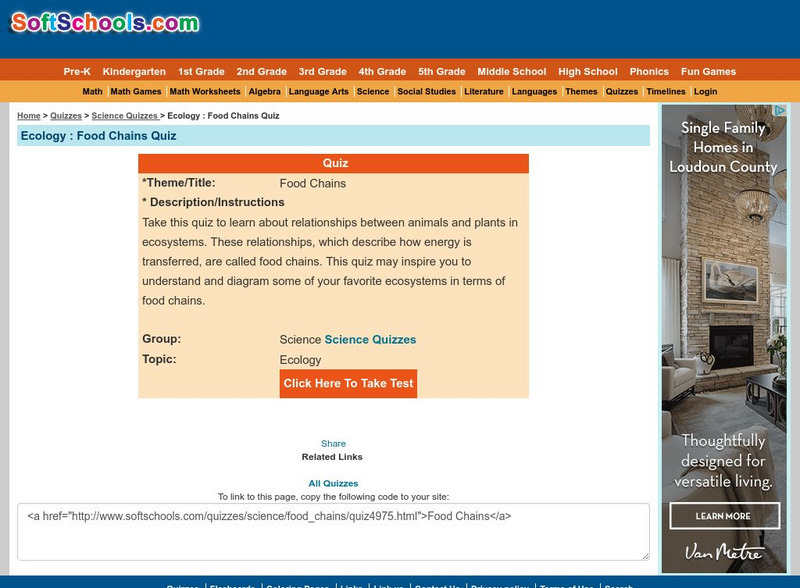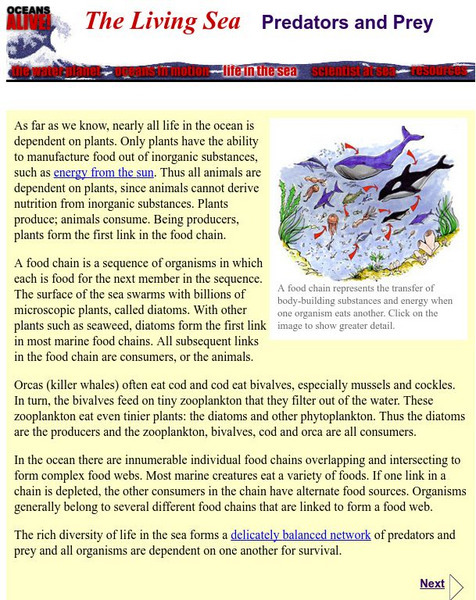E-learning for Kids
E Learning for Kids: Science: South Africa: How Do Organisms Get Their Energy?
Join Ellen on her trip to the Kaap De Goede Hoop in South Africa, and learn more about plants, animals, and energy.
Scholastic
Scholastic: Endangered Ecosystems: Build a Food Web
Investigate some animals and see where they are in the food web. Build your own food web and relate it to the endangered species biomes.
Next.cc
Next: Birds
Multiple activities help students gain a better understanding of birds and their role in the food web. Click on the links provides for further exploration.
Science Education Resource Center at Carleton College
Serc: Investigating Animals: Interdependence of Life in a Habitat
In this activity, students will learn how changes in nature can be beneficial or harmful to animals. At the end, students will be able to conclude information according to the evidence collected.
Science Education Resource Center at Carleton College
Serc: Investigating Ecosystems:determining Feeding Relationships Among Organisms
In this lab, students will complete a field study about feeding relationships between organisms and present their findings in a food web as well as in a written narrative.
Sheppard Software
Sheppard Software: Food Chain
Have a look at a simple food chain and others that are more complex. Then construct a series of food chains by playing a drag-and-drop game.
Polk Brothers Foundation Center for Urban Education at DePaul University
De Paul University: Center for Urban Education: Breaking the Food Chain [Pdf]
"Breaking the Food Chain" is a one page, non-fiction, reading passage about the food chain which links plants and animals. If the food chain is disrupted, it can cause plants and animals to disappear. It is followed by...
Polk Brothers Foundation Center for Urban Education at DePaul University
De Paul University: Center for Urban Education: Changing the Ecosystem [Pdf]
"Changing the Ecosystem" is a one page, nonfiction, reading passage about the disruption in the food chain due to habitat loss and pollution and the results of that disruption. It is followed by questions which require students to...
FT Exploring
Ft Exploring: Energy Pyramid and Food Chains
This illustrated guide to food chains and ecological pyramids will help clarify how energy flows through an ecosystem.
Other
The Dirty Dozen Persistent Organic Pollutants
Use this site to learn about the effects of persistent organic pollutants on the ecology of Antarctic coastal waters. Information is presented for both teacher and student researcher.
Other
Marietta College: Biology: Energy Flow Through the Ecosystem
Read to understand how energy and inorganic nutrients flow through a food chain in an ecosystem.
Scholastic
Scholastic: Study Jams! Science: Ecosystems: Food Webs
A video and a short multiple-choice quiz on food webs that explains the difference between food webs and food chains, and the relationships that exist between organisms.
Sophia Learning
Sophia: Food Webs: Lesson 1
This lesson will explain how to create a food web to show transfer of energy within a community. It is 1 of 4 in the series titled "Food Webs."
Bio Topics
Bio Topics: Ecological Pyramids
A colorful tutorial about ecological pyramids. Read the information, and then check your understanding with some questions and answers about the topic.
CK-12 Foundation
Ck 12: Life Science: Consumers and Decomposers
[Free Registration/Login may be required to access all resource tools.] Producers make their own food through photosynthesis. But many organisms are not producers and cannot make their own food, but must get their energy from other...
CK-12 Foundation
Ck 12: Earth Science: Flow of Energy in Ecosystems
[Free Registration/Login may be required to access all resource tools.] Describes how energy is transfered from one organism to another.
Soft Schools
Soft Schools: Food Chains Quiz
Take an interactive quiz over food chains. After completing the quiz, check your score, and then revisit any incorrect question for further review.
Geography 4 kids
Geography4 kids.com: Another Link in the Food Chain
Understand how the food chain works within ecosystems.
TeachEngineering
Teach Engineering: Go With the Energy Flow
Students learn about energy and nutrient flow in various biosphere climates and environments. They learn about herbivores, carnivores, omnivores, food chains and food webs, seeing the interdependence between producers, consumers and...
Other
Marietta College: Environmental Biology Sequence: Food Chains and Webs
View examples and learn how animals impact the food chain.
Texas Education Agency
Texas Gateway: Energy and Matter in Ecosystems
Learners analyze food chains, webs, and pyramids to determine how energy flows and matter cycles through ecosystems.
University of Utah
University of Utah: Learning Center: learn.genetics: Great Salt Lake Food Web
Visualize how energy transfer takes place in two linked food chains, and how it demonstrates the interdependence organisms of the Great Salt Lake.
Science Struck
Science Struck: Examples of Tertiary Consumers
Explains what is meant by a tertiary consumer in a food chain and provides examples.
Museum of Science
Museum of Science: The Living Sea: Predators and Prey
This Museum of Science page does an excellent job of explaining the importance of plants as producers in the sea. The food chain or food web has to start with the plants.





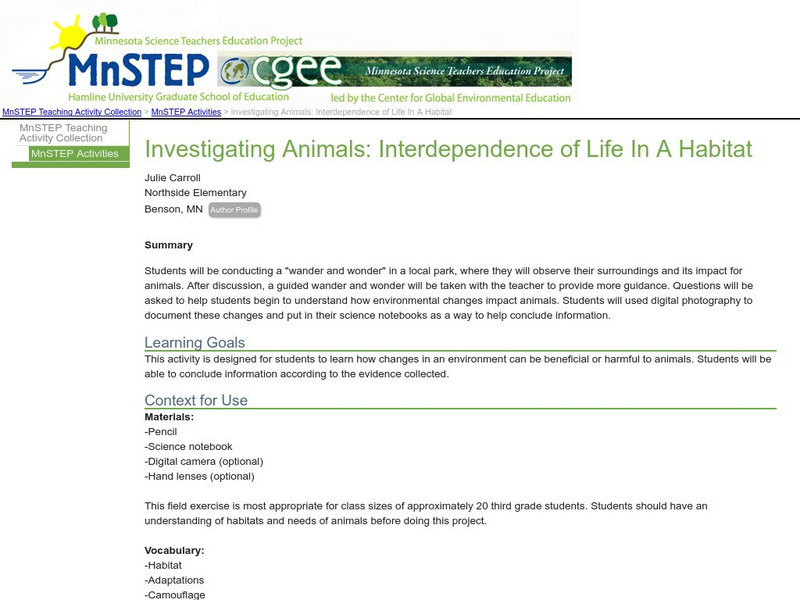


![De Paul University: Center for Urban Education: Breaking the Food Chain [Pdf] Unit Plan De Paul University: Center for Urban Education: Breaking the Food Chain [Pdf] Unit Plan](https://d15y2dacu3jp90.cloudfront.net/images/attachment_defaults/resource/large/FPO-knovation.png)


